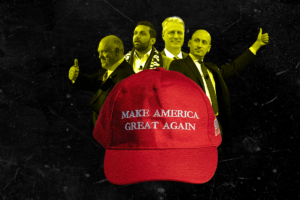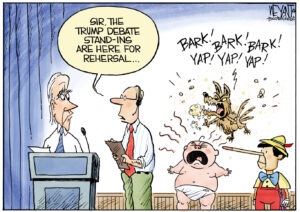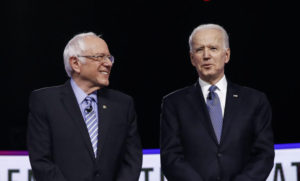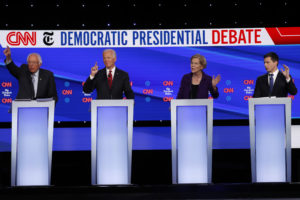A Tale of Two Parties
So when Democratic presidential candidates get together, they argue about who has the best healthcare plan. When Republicans have a big discussion, it's about torture and who'll use it when.WASHINGTON — So when Democratic presidential candidates get together, they argue about who has the best healthcare plan. When Republicans have a big discussion, it’s about torture and who’ll use it when.
OK, OK, Republicans had their chat about torture in one debate in response to a hypothetical question. Still, the contrast points to one of the strangest qualities of the 2008 presidential campaign: Our two political parties and their candidates are living in parallel universes. It is as if they were running for president in two separate countries. Their televised debates next week will be productions as different from each other as “American Idol” is from “P.T.I.”
The parties do have some things in common — Iraq and the economy are concerns for both. But beyond these two issues, what matters most to Republican voters is hugely different from what matters most to Democrats. The polarization between our parties now extends to the very definition of our country, its problems and the stakes in the next elections.
Consider an April Pew Research Center survey whose findings the center kindly re-analyzed for me. Asked to name the issue that would most affect their choice for president, Iraq was first in both parties — but it was named by 40 percent of Democrats and only 29 percent of Republicans. If Democrats in Congress wonder why they got so many e-mails and phone calls on the recent war-funding vote, that’s why.
On almost every other issue, the gaps between the parties are even more striking. Heathcare was the most important for 13 percent of Democrats but only 2 percent of Republicans. On the other hand, 17 percent of Republicans said issues related to terrorism and security were decisive in their choices, compared with 5 percent of Democrats. Terror is actually the No. 2 issue for Republicans, behind Iraq and slightly ahead of the economy. (The economy is No. 2 for Democrats, after Iraq.) No wonder Republicans got into all that detail last month about “enhanced interrogation techniques.”
Education was decisive for 12 percent of Democrats and only 5 percent of Republicans; abortion for 8 percent of Republicans, and just 1 percent of Democrats; immigration for 12 percent of Republicans and 1 percent of Democrats.
Consolidating these results dramatizes how different Democraticland is from Republicanland: 42 percent of Democrats listed one of three big domestic issues (the economy, healthcare and education) compared with only 20 percent of Republicans. The hot-button issues of immigration and abortion were overwhelmingly Republican concerns (20 percent to 2 percent).
The New York Times/CBS News Poll and the Fox News/Opinion Dynamics Poll taken this month and an earlier Washington Post/ABC News Poll found similarly large differences in the agendas of each party.
Think of the implications: The Democratic mind is focused on serious domestic problems, the Republican mind on terrorism and national security. How will the two parties reach any consensus on issues that the other side cares about so much more?
Republicans will have little incentive to compromise to achieve healthcare reform. Democrats don’t perceive the terror threat at all the same way as Republicans do. Republicans have less room for compromise on immigration, given the passion on the issue within their ranks.
In their primary fight, why should Republicans talk much about any domestic problem? Mitt Romney will not gain much by discussing the new Massachusetts health plan he pushed through, nor will Mike Huckabee get many votes by touting the education reforms he championed in Arkansas. The good news for Rudy Giuliani is that his talk about terrorism wins him a real audience in his party. The bad news is that the abortion issue, a stumbling block for him, matters far more to the Republicans he needs to court now than to Democrats or independents.
On the other side, the Democrats’ discussion of healthcare is well advanced into the details, such as whether Barack Obama’s new proposal on the subject is sufficiently universal. Hillary Clinton gave a powerful speech on economic inequality earlier this week in New Hampshire full of specific proposals and rhetoric every bit as populist as John Edwards’ greatest hits. All three know who their audience is.
And so the Democrats who debate on Sunday and the Republicans who debate on Tuesday will offer a portrait of an election in which our parties are speaking different languages to two very different Americas. This can’t be good for us, and it surely won’t help whoever is lucky or unlucky enough to be our next president.
E.J. Dionne’s e-mail address is postchat(at symbol)aol.com.
© 2007, Washington Post Writers Group
Your support matters…Independent journalism is under threat and overshadowed by heavily funded mainstream media.
You can help level the playing field. Become a member.
Your tax-deductible contribution keeps us digging beneath the headlines to give you thought-provoking, investigative reporting and analysis that unearths what's really happening- without compromise.
Give today to support our courageous, independent journalists.








You need to be a supporter to comment.
There are currently no responses to this article.
Be the first to respond.